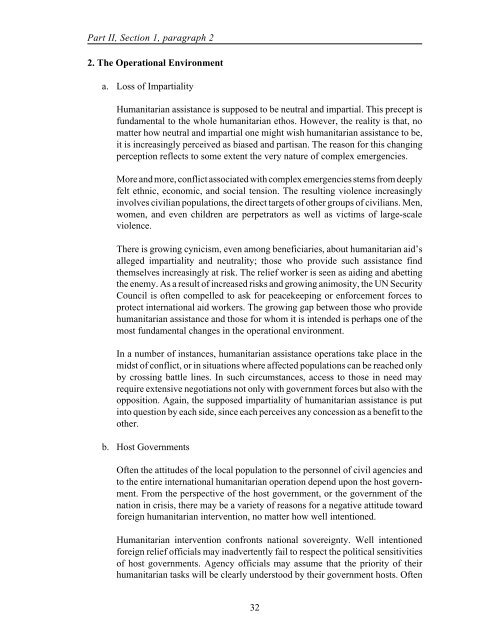a guide to peace support operations - The Watson Institute for ...
a guide to peace support operations - The Watson Institute for ...
a guide to peace support operations - The Watson Institute for ...
Create successful ePaper yourself
Turn your PDF publications into a flip-book with our unique Google optimized e-Paper software.
Part II, Section 1, paragraph 2<br />
2. <strong>The</strong> Operational Environment<br />
a. Loss of Impartiality<br />
Humanitarian assistance is supposed <strong>to</strong> be neutral and impartial. This precept is<br />
fundamental <strong>to</strong> the whole humanitarian ethos. However, the reality is that, no<br />
matter how neutral and impartial one might wish humanitarian assistance <strong>to</strong> be,<br />
it is increasingly perceived as biased and partisan. <strong>The</strong> reason <strong>for</strong> this changing<br />
perception reflects <strong>to</strong> some extent the very nature of complex emergencies.<br />
More and more, conflict associated with complex emergencies stems from deeply<br />
felt ethnic, economic, and social tension. <strong>The</strong> resulting violence increasingly<br />
involves civilian populations, the direct targets of other groups of civilians. Men,<br />
women, and even children are perpetra<strong>to</strong>rs as well as victims of large-scale<br />
violence.<br />
<strong>The</strong>re is growing cynicism, even among beneficiaries, about humanitarian aid’s<br />
alleged impartiality and neutrality; those who provide such assistance find<br />
themselves increasingly at risk. <strong>The</strong> relief worker is seen as aiding and abetting<br />
the enemy. As a result of increased risks and growing animosity, the UN Security<br />
Council is often compelled <strong>to</strong> ask <strong>for</strong> <strong>peace</strong>keeping or en<strong>for</strong>cement <strong>for</strong>ces <strong>to</strong><br />
protect international aid workers. <strong>The</strong> growing gap between those who provide<br />
humanitarian assistance and those <strong>for</strong> whom it is intended is perhaps one of the<br />
most fundamental changes in the operational environment.<br />
In a number of instances, humanitarian assistance <strong>operations</strong> take place in the<br />
midst of conflict, or in situations where affected populations can be reached only<br />
by crossing battle lines. In such circumstances, access <strong>to</strong> those in need may<br />
require extensive negotiations not only with government <strong>for</strong>ces but also with the<br />
opposition. Again, the supposed impartiality of humanitarian assistance is put<br />
in<strong>to</strong> question by each side, since each perceives any concession as a benefit <strong>to</strong> the<br />
other.<br />
b. Host Governments<br />
Often the attitudes of the local population <strong>to</strong> the personnel of civil agencies and<br />
<strong>to</strong> the entire international humanitarian operation depend upon the host government.<br />
From the perspective of the host government, or the government of the<br />
nation in crisis, there may be a variety of reasons <strong>for</strong> a negative attitude <strong>to</strong>ward<br />
<strong>for</strong>eign humanitarian intervention, no matter how well intentioned.<br />
Humanitarian intervention confronts national sovereignty. Well intentioned<br />
<strong>for</strong>eign relief officials may inadvertently fail <strong>to</strong> respect the political sensitivities<br />
of host governments. Agency officials may assume that the priority of their<br />
humanitarian tasks will be clearly unders<strong>to</strong>od by their government hosts. Often<br />
32

















